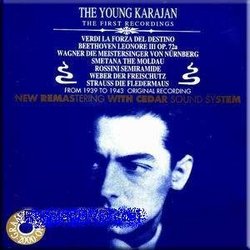| All Artists: Karajan, Berlin Philharmonic Title: First Recordings 1939-43 Members Wishing: 1 Total Copies: 0 Label: Grammofono 2000 Release Date: 3/28/1995 Genre: Classical Styles: Opera & Classical Vocal, Forms & Genres, Theatrical, Incidental & Program Music, Historical Periods, Classical (c.1770-1830), Modern, 20th, & 21st Century, Symphonies Number of Discs: 1 SwapaCD Credits: 1 UPCs: 723721991920, 8011662902856, 801166290285 |
Search - Karajan, Berlin Philharmonic :: First Recordings 1939-43
 | Karajan, Berlin Philharmonic First Recordings 1939-43 Genre: Classical
|
Larger Image |
CD Details |
CD ReviewsThe Young And The Genius: Karajan's Earliest Record Rudy Avila | Lennox, Ca United States | 08/16/2005 (5 out of 5 stars) "At long last, my search is over. For some time, I went in search of a recording that features the earliest recorded material of the conductor Herbert Von Karajan, who needs no introduction. This Titan conductor of the 20th century is mostly famous for his latter work- princicpal conductor of the Berlin Philharmonic and Vienna Philharmonic. In his older years, in the 80's, he died in 1988 ? He recorded several cd albums of symphonies and other classical pieces with the famous Berlin forces he helped shape into the world's leading orchestra. This album includes powerful, vibrant music conducted by a youthful and energetic Karajan. This is Karajan in his prime, still trying to find his niche. He conducts a variety of classical repertoires- his interest in opera is showcased in the overture to Verdi's Forza Del Destino and Overture to Beethoven's Leonore, later renamed Fidelio. The Germanic fantasy opera, Die Freuschutz by Webber is here and very well-executed. Further, he conducts a brilliant Moldau by Smetana, Rossini's Semiramide Overture and Strauss' Overture to Die Fledermaus. While much of these are not serious symphonic works, they are well-executed and of great interest to Karajan fanatics.
Through the post-World War II Era of LP's and film, Karajan easily became the Master Conductor of Europe. I have discovered he is truly at his best in the 60's, 70's and 80's. Toward the end, he had more intensity and even in his old age he was thrilling. But here we have recorded performances from the years 1939-1943, which let's face it was the World War II period. At this time, Karajan is young and adamant about remaining in his native Austria and beloved Germany despite the presence of Adolph Hitler's Third Reich. Karajan refused to leave his conducting position in Europe, even while many other conductors fled to America, horrified at the evils Hitler and his Nazi were committing. Karajan was thus linked with the Nazi Party, something which was actually not a huge stigma for him. Karajan always claimed he was only staying true to Austria, to his home continent and not to the twisted principles of Nazism. Furthermore, and this is my own assessment, the young Karajan JUST HAD to remain conducting in Europe in order to conquer the classical musical scene there. If he made it to the top as conductor in Europe, he would be set for life. His option to remain in his home country HELPED establish himself as the world's leading conductor after Toscanini. So, it was not so much because he sympathized with the Nazis or was a full-blooded Nazi himself, but because of his musical ambitions. If Karajan had been loathed for his refusal to leave Europe like so many conductors (many of whom were either Jewish or friends with Jews who were in their orchestras)- he was eventually pardoned and redeemed because he clearly demonstrated he had nothing in common with the racist Nazis. He championed ethnically diverse opera singers and musicians throughout his entire career. Among these are: African-American diva Leontyne Price (worked with her conducting her studio recordings of Tosca and Il Trovatore) black mezzo soprano star Grace Bumbry (Conducted her Carmen for her performances in the Salzburg Festival)- this was in the 60's. In the 70's he championed Asian instrumentalists and even the Korean soprano Sumi Jo whom he discovered in the 80's." |

 Track Listings (7) - Disc #1
Track Listings (7) - Disc #1